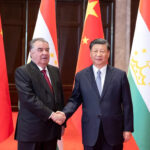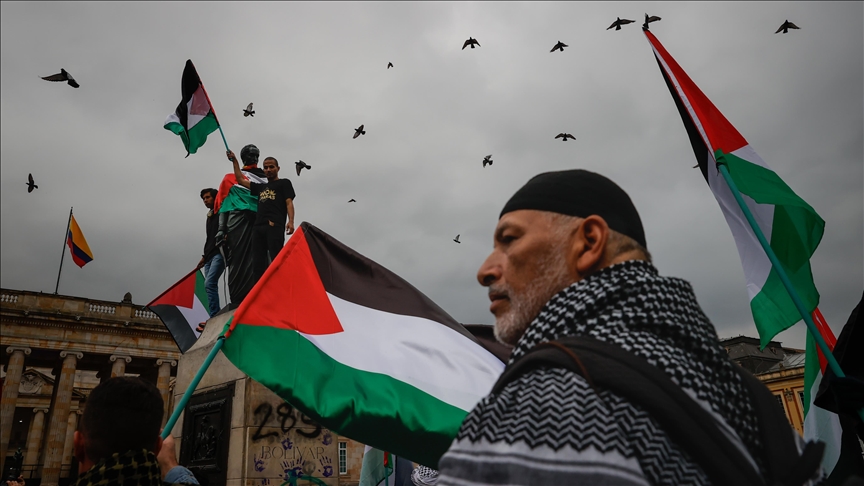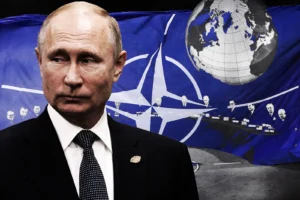In the wake of the ongoing Hamas-Israel conflict that erupted last month, some Latin American countries have taken a strong stance in support of Palestine, severing diplomatic ties with Israel and strongly condemning the relentless bombing on the Gaza Strip.
Colombia, Chile, and Bolivia have emerged as the most vocal critics of Israel on the South American continent.
One of Latin American’s largest economies, Colombia was one of the first countries to denounce the Israeli attack on Gaza, recently recalling its ambassador for consultations as it threatens to suspend diplomatic ties with Tel Aviv.
To help Palestinians in the besieged enclave lacking electricity, water, and other essentials due to ongoing Israeli blockade, Colombia also dispatched a plane carrying humanitarian aid.
President Gustavo Petro has already called Israel’s attack on Gaza a “genocide,” openly voicing criticism of Israel on X.
Commenting on Israel-Colombia ties, senior International Crisis Group analyst Elizabeth Dickinson told Anadolu that prior to the escalation of the conflict in Gaza early last month, relations had been friendly between the two countries.
“There is a strong diplomatic relationship historically between Colombia and Israel. And Israel has a very active embassy here,” said Dickinson, who is based in Bogota.
Ties turned sour, however, when Colombia expressed solidarity with Palestinians during the ongoing conflict.
Bolivia has also been critical of Israel, becoming the first country to cut off diplomatic ties with Tel Aviv.
Its foreign minister accused Israel of committing crimes against humanity and “demanded” an end its attacks on the Gaza Strip.
This was not the first time the central Latin American nation suspended relations with Israel. It had done so in 2009 under the former government of leftist President Evo Morales in a moved also triggered by Israel’s actions in Gaza.
Ten years later, the government of right-wing President Jeanine Anez re-established ties with Israel.
Expert on international relations, Mariano de Alba asserts that unlike Colombia, Israel’s relations between Bolivia have been rocky for many years.
Another South American country, Chile has also recalled its ambassador from Israel.
In a video interview with Anadolu, de Alba analyzed the move by Colombia and Chile, noting that their governments were “really worried about the disproportionate use of force by the Israeli military.”
Another country to condemn Israel was Venezuela, whose government called recent Israeli strikes on the al-Shifa Hospital in the Gaza Strip a “massacre.”
De Alba, also a senior adviser with the International Crisis Group, said relations between Venezuela and Israel have been almost non-existent for years since Hugo Chavez was in power, mainly the result of animosity against the US, a staunch ally to Israel.
Meanwhile, Chavez’s government established alliances with some Arab nations, including the Palestinian Authority, he added.
Leftist leaders
In an analysis published by the Elcano Royal Institute in Spain, experts found that during the current crisis, countries favoring Palestinians tend to have leftist leaders, while right-wing led governments are voicing solidarity with Israel.
On the role of leftist leaders, Dickinson said that in Latin America, “we have a new generation of leftist leaders who are not only on the left but also quite strong on human rights issues. And this is demonstrative in how they are trying to take this to the global stage.”
Colombia is a country that has suffered violent conflict for decades, and the current government has maintained a policy of reducing the fighting with internal armed groups and seeking dialogue instead, she adds.
“There is an alignment in that thinking that, globally as well, diplomacy is the way forward.”
Dickinson also thinks that Chile, Bolivia, and Colombia probably coordinated among themselves in their stance towards Israel to send a strong message.
“They are like-minded in terms of their foreign policy, and so it appears their decision was likely coordinated.”
She added that these countries had coordinated on other policies as well, becoming an “advocacy bloc” with “progressive leaders,” she elaborated.
According to de Alba, the “leftist government that currently governs Bolivia has always been very careful and has not had close ties with Israel.”
Military cooperation
Before the recent tensions, Israel had also enjoyed military cooperation with many Latin American countries, including Colombia.
But due to Colombia’s recent criticism, Tel Aviv has said it would suspend “security exports.”
Colombia reportedly uses Israeli-made planes and machine guns to fight drug cartels and rebel groups.
Experts have voiced concern that the current suspension of ties could deal a blow to Israel’s military assistance to the South American country.
“There are some military purchases, which is the most concrete thing that could be affected by this situation. For example, a number of aircrafts made and maintained by Israel,” said Dickinson.
For his part, de Alba pointed out, however, that the relationship was “not really important” in economic terms. But along with defense, cooperation between on cybersecurity could also be in jeopardy, he added.
Palestinian diaspora in Latin American countries
Experts have argued that the stance of these countries was also influenced by their large populations of Palestinian-origin people.
According to Dickinson, Colombia is home to a significant Palestinians diaspora, as well as a substantial Jewish community.
“The situation has hit home for a lot of families, who trace their origins to the region,” she said.
Chile is said to be home to around half a million people of Palestinians origin, the largest diaspora outside the Middle East.
“Chile has a very important Palestinian diaspora so that they have to factor that fact into account in the response of the government,” said de Alba.
Two-state solution
Both experts agree that Latin American countries are strongly vouching and promoting a two-state solution, while many also support a cease-fire and humanitarian relief for civilians in Gaza.
“Columbia is very clear that its policy is for two-state solution,” said Dickinson.
She also said that by working as a group, Latin American countries could influence the conflict to a small extent.
“There is a need for humanitarian de-escalation and that what is happening today in Gaza is not in consistence with the region’s support for a two-state solution and the protection of civilians, the respect for international humanitarian law.”
De Alba said that while the South American region is divided, with some countries supporting Israel, there is a consensus on three issues.
“One on the two-state solution. Two on, basically, widespread condemnation of what Hamas did on Oct. 7, and three, there’s also widespread condemnation of what Latin American countries consider as a disproportionate response by Israel.”
“This is because Israel are targeting civilians and women and children are being killed. it’s a clear violation of international humanitarian law.”
The Israeli army has widened its air and ground attacks on the Gaza Strip, which has been under relentless airstrikes since the surprise offensive by Hamas on Oct. 7.
Nearly 10,800 people have been killed so far in the conflict between Palestinian resistance group Hamas and the Israeli military, including at least 9,227 Palestinians and more than 1,538 Israelis.
Source : aa
















